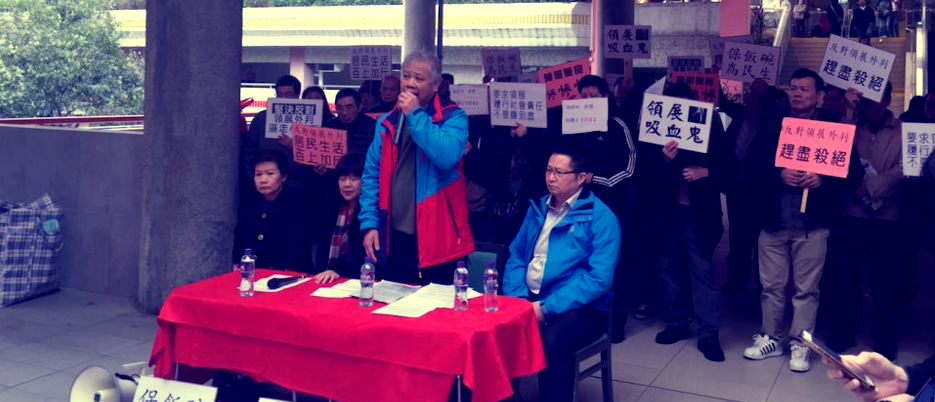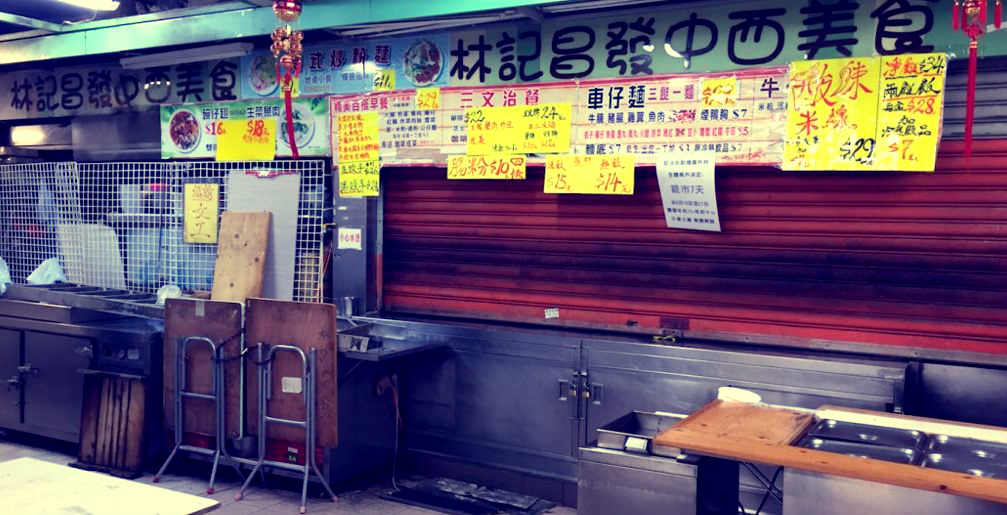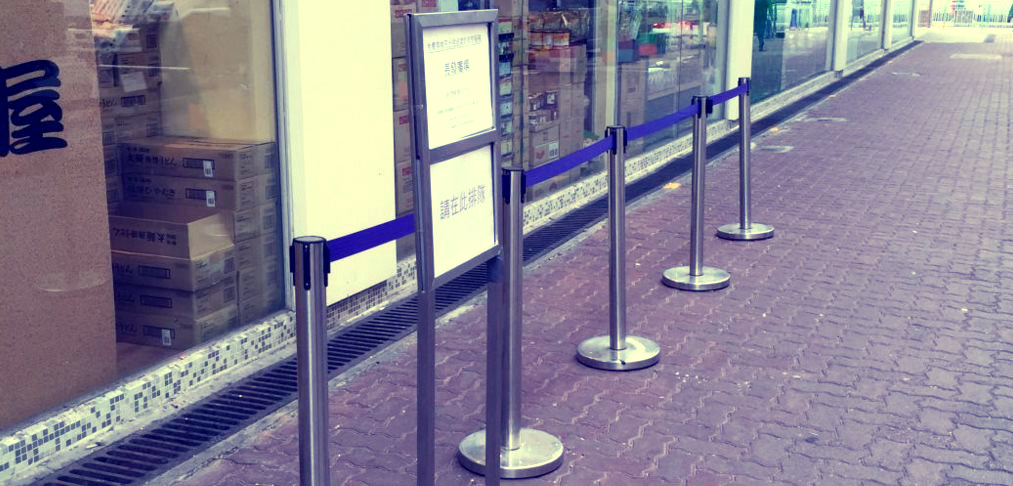As the Cheung Fat Market strike drew to a close on Monday, the stall owners’ fight to preserve the warmth of the community against unaffordable rents is still set to continue. Link REIT, a real estate investment trust, recently announced that it signed a deal outsourcing market management to Uni-China (Market) Management Limited, which stall owners at the Tsing Yi market fear will raise rents to exorbitant levels.
The stall owners’ union voiced demands throughout last week for Link REIT, who has managed the market since 2009, to either retract the deal with Uni-China or to ensure that contracts are extended for three years with the promise of acceptable rent rises. However, both sides have accused the other party of refusing to discuss the matter sincerely and the demands have remained unmet.

Against the pressure of rent raises looms another problem for the market located on the Cheung Fat estate in Tsing Yi. A sense of paranoia permeates the estate as many are spooked by the Leung King Market incident and belief that the new management has a “background.”
‘They all have a background’
Some residents of the Cheung Fat estate see their fate playing out as it did at Leung King’s market, which has similarly been outsourced to Uni-China.
At the market, Uncle Chow, a Cheung Fat estate resident, shook his head as he read a photocopy of a newspaper article taped to a pillar. The article was a report on an incident where suspicious “security officers” were accused of beating up illegal hawkers at Tuen Mun’s Leung King Estate earlier this month.
“The company to which Link REIT has outsourced to, you know, they all have a background. It’s not that simple,” Chow told HKFP. “You know, what happened in Leung King… I just hope that everyone can live in peace, stuff is happening everywhere now.”
The fear also plays out in other ways. When contacted for an interview, the Cheung Fat Market Concern Group, which posts updates about the stall owners on Facebook, was cautious about speaking to journalists. It too cited the background of Uni-China and the Leung King incident as a reason for ensuring personal safety.

When HKFP asked Link REIT why it chose Uni-China, the investment fund said that “the practice of outsourcing market management started in the era of the authority. It has a history of over twenty years and is an effective practice. Link REIT works with six management companies, which have always been picked based on their management performance and service quality.”
Despite the Leung King incident, the store owners, however, have little choice but to protest, for losing the market means also putting their livelihoods in danger.
The loss of a livelihood
A baker surnamed Tsang, who opened a bakery at Cheung Fat Market six years ago, mulled over the relationships he had formed with the residents over the years. “We have good relationships. They are all my friends whether they are a few months old or eighty, ninety years old,” he said. “Many of them think it’s inconvenient, and if I don’t continue, they’ll be sad, because freshly made bread is getting harder and harder to find nowadays.”
“We don’t really want to do this, it’s like we’re holding the shoppers hostage,” he added.

Tsang is one of the stall owners participating in the strike against the investment trust. Like other the stall owners, he believes that rents will rise severalfold if the management is handed over to Uni-China, an allegation which Link REIT has denied.
Tsang currently pays 35 percent of his rent to Link REIT. However, he says that he expects the rent to go up at least one to two times the current rate after Uni-China takes over. “There’ll be no way to continue running my stall,” he said. When asked if he would move his stall to another market, he said it was impossible given the practice of outsourcing.
A vegetable vendor surnamed Lam expressed similar sentiments. “It’ll be impossible to continue to run stall elsewhere. We’ve seen Leung King, Siu Sai Wu and Sheung Shui,” he said when asked about the possibility of moving.

Finding another stall was also financially challenging. “Getting into the [Cheung Fat] market will set you back $60,000… This is only normal. Some other places will ask for more than 100,000,” he said.
No shortage of alternatives
Cheung Fat Estate is an elderly neighbourhood. Many of its residents are past retirement age and are no longer working. For most of them, the market offers a balance between convenience and price. If they can save enough going to Tsuen Wan Market, which is about twenty minutes away by public transport, they may choose to go there instead. According to one housewife, the same product at Cheung Fat is “sometimes twice the price of the same thing in Tsuen Wan.”
Chow, an elderly resident, said: “Taking the bus only costs HK$2 for the elderly, how can we stand it?”
There is no dearth of choice in Cheung Fat estate itself either. Staff at the local supermarket also said that there was a sharp increase in shoppers, especially in the fresh meat and vegetables sections. “There’s at least a two-thirds increase,” said a staff member surnamed Yip in the meat section.

However, while Link REIT has provided free shuttle buses to and from the Tsing Yi market, most of the residents do not utilise the service. The temporary bus stop remains empty throughout the day, with a few lone residents waiting at the stop for the half-hourly service.
Fading hope
For the most part, the residents and stall owners have lost their faith in the investment trust. At a press conference held by the stall owners last Thursday, the stall owners’ union representative Lee Kam-Yuen said that they would seek the help of the government and Chief Executive Leung Chun-ying since “we do not have anywhere else to go.”
On Saturday, having made no progress with Link REIT, the stall owners headed to the Chief Executive’s Office to protest and hand over a letter.

“We don’t believe that talks with Link REIT will help accomplish things. That’s why we’re hoping that the government can step in to help the store owners,” said “Editor J” of the Cheung Fat Market Concern Group.
Link REIT, on its part, has said that the union refused to reply after “enthusiastic attempts to contact the representative of the stall owners on Tuesday night.”
“We also contacted Uni-China (Market) Management Limited immediately and reflected the opinions of the stall owners,” it added. “Uni-China contacted the stall owners on February 17, but most stall owners did not want to talk to Uni-China. We find it difficult to understand the stall owners’ accusations.”
The union maintains that Link REIT told them that “if they don’t stop striking, there will be no room for discussion” and that Link REIT “cannot arrange a meeting between Uni-China and the stall owners unless the strike ends.”
As the strike ended on Monday, the stall owners reopened their stalls. Though they have pledged to step up their protest against Link REIT’s decision, it not yet known what action they will take.
